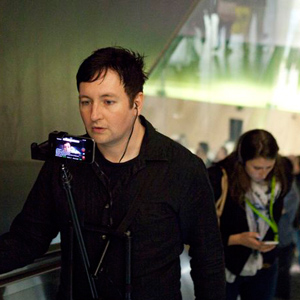 A Guest blog-post by Glen Tarman, a founding member of the art collective, Libertate Tate
A Guest blog-post by Glen Tarman, a founding member of the art collective, Libertate Tate
Every day this week in marking the third anniversary of the Deepwater Horizon disaster, the art collective Liberate Tate is giving a performance dramatizing the trial of BP. It’s entitled ‘All Rise’ and is all taking place at the Tate Modern in London.
It’s not unusual for artists and cultural events to reference contemporary news or disasters. The difference here is that this is a guerrilla performance, completely unsanctioned by Tate or by one of its sponsors: BP.
Each day this week at 3pm UK time (GMT+1), performers using specially constructed cameras will film themselves wandering Tate Modern whilst whispering selected transcripts of the proceedings from the New Orleans courtroom.
The live-streams of the different performers are available to watch online from around the world on the dedicated website (where an archive allows future viewing).
The BP trial, which started this February, accuses the massive corporation of gross negligence by plaintiffs who did not take part in a separate settlement made by the oil giant last year.
At the trial’s opening, Assistant U.S. Attorney Mike Underhill said: “Not only was it within BP’s power to prevent the tragedy, it was its responsibility.”
As Paul Brady, one of the performers on Monday April 22, underlined: “It’s not only BP that’s on trial for the devastation it has caused to Gulf Coast communities and ecosystems, it’s also Tate and other cultural institutions that provide BP with the social legitimacy to continue operating with such destructive consequences.”
‘All Rise’ is a performance that brings the BP trial into Tate Modern because BP’s arts sponsorship cannot be separated from the irrevocable damage it does to communities, the environment, and the climate.
For example, BP’s first advertising campaign after the Gulf of Mexico disaster was in the summer of 2011 and used the corporation’s sponsorship of art in a multi-million dollar attempt to rehabilitate its brand. This was very deliberate. The value to BP of the arts establishment that supports the oil company by accepting its sponsorship money is clear: BP uses its involvement in arts and culture to project a “feel good” image of the company.
In doing so, BP buys the leverage it needs to gain acceptance from elites and influential publics to carry on plundering the planet, to proliferate human rights abuses, and to interfere in what should be democratic political processes.
What is so invidious is that public cultural institutions also fall into what BP has captured.
This is why Liberate Tate has vowed, since its founding in January 2010, “to take creative disobedience against Tate until it drops its oil company funding.” And to inspire others to join in doing so as well.
‘All Rise’ follows a performance by Liberate Tate last July when over 100 members of the art collective installed ‘The Gift’ — a 16.5 metre wind turbine blade — in the Turbine Hall of Tate Modern.
On the first anniversary of the Deepwater Horizon disaster in 2011, Liberate Tate poured oil over a naked man lying in the middle of Tate Britain in a work called ‘Human Cost’.
This week as we whisper extracts from the court transcripts — damning reports, objections, evidence, accountability, and risk throughout the BP sponsored Tate gallery spaces — we insistently ask: How much more environmental, societal, and climate damage does BP need to do for Tate to forego its sponsor? When will Tate put their sponsor on the stand?
The good news is that the public call for Tate to stop its relationship with BP is growing. Thousands of Tate members and visitors have voiced their objection that through its support of sponsor BP, Tate is forcing environmentally and climate-conscious gallery goers into an uncomfortable position of complicity with the oil company, one of the most environment-destroying corporations on the planet.
When our public cultural institutions have a formal relationship with corporations engaged in socially and ecologically destructive activities, exhibitions and galleries become part of the creation of climate chaos through the construction of a social licence to operate for oil companies.
Our practice involves illuminating this process at the culture wellhead through interventions and artworks created in Tate galleries.
We situate our interventions in the growing wave of desire for citizens to reclaim public space: a gallery should be a place to enjoy great art, not a site where an art museum associates visitors in the ecological destruction and criminal acts of its corporate partners.
About the Author
Glen Tarman is an artist, activist and advocacy director based in London. Glen is a founding member of the art collective Liberate Tate. Liberate Tate explores the role of creative intervention in social change and aims to free art from the grips of the oil industry.
For more information on Liberate Tate, see http://liberatetate.wordpress.com/. Liberate Tate can also be found on Twitter: @liberatetate